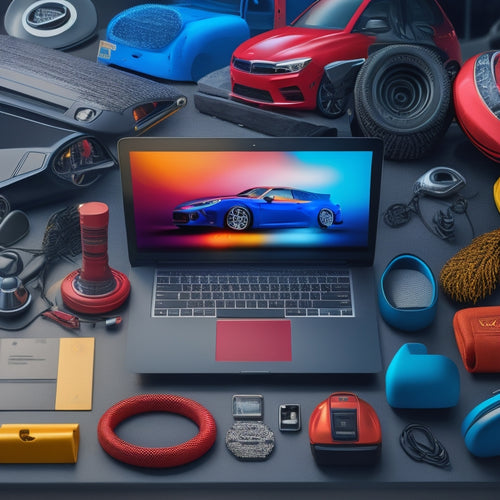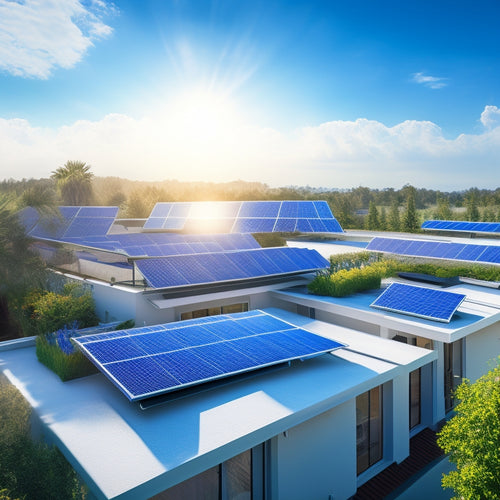
What Affects Your Solar Panel Energy Output?
Share
You know your solar panels can generate a significant amount of electricity, but did you know that various factors can impact energy output? Environmental conditions like temperature, humidity, and air quality play a role, as do weather patterns, seasonal changes, and your location's unique climate. The orientation and tilt of your panels, shading, and obstructions also affect energy production. Additionally, regular maintenance and upkeep are essential to guarantee maximum power generation. By understanding these factors, you'll be able to optimize your system's performance and maximize your energy output. You'll want to explore these factors in more detail to get the most out of your solar panel investment.
Key Takeaways
• Atmospheric conditions like temperature, humidity, and air quality impact solar panel energy output.
• Panel orientation and tilt significantly affect energy production, with south-facing orientation being the most effective.
• Shading and obstructions, including trees and nearby buildings, can greatly reduce solar panel energy output.
• Seasonal changes, including winter months with shorter days and angled sunlight, influence energy production.
• Regular cleaning and maintenance are crucial to maintain peak energy output and extend system lifespan.
Environmental Factors at Play
When evaluating the performance of your solar panel system, it's vital to take into account the environmental factors that greatly affect energy output. Atmospheric conditions, such as temperature, humidity, and air quality, play a significant role in determining how efficiently your panels generate power.
Weather patterns, including cloud cover, precipitation, and wind, also have a substantial impact on energy production. As you monitor your system's performance, consider the effects of seasonal changes, such as the angle of the sun and daylight hours, which can influence energy output.
It's imperative to understand that your location's unique climate and weather patterns can either enhance or hinder your solar panel system's ability to produce energy. By acknowledging these environmental factors, you can optimize your system's performance and maximize energy output.
Panel Orientation and Tilt Matters
Properly orienting and tilting your solar panels greatly enhances energy output, as even slight miscalculations can lead to substantial losses in power generation. When you're installing solar panels, it's important to take into account the roof pitch and azimuth angle to maximize energy output. A slight deviation from the best orientation can notably reduce energy production.
Here are some key considerations to keep in mind:
-
Azimuth angle: Ideally, your solar panels should face directly at the sun, which means a south-facing orientation is most effective. However, if that's not possible, an east- or west-facing orientation can still generate a significant amount of energy.
-
Roof pitch: The angle of your roof affects the tilt of your solar panels. A steeper roof pitch can help snow slide off, but it may also increase the risk of wind damage.
-
Latitude and climate: Your location's latitude and climate influence the best tilt and orientation of your solar panels. In areas with heavy snowfall, a steeper tilt can help with snow removal.
-
Shading and obstructions: While we'll cover shading and obstructions in more detail later, it's important to consider these factors when determining the most suitable orientation and tilt of your solar panels.
-
Local building codes and regulations: Make sure you comply with local building codes and regulations regarding solar panel installation, including orientation and tilt restrictions.
Shading and Obstruction Impact
Shading and obstructions can greatly diminish your solar panel energy output, and you'll want to carefully assess your installation site to minimize their impact. Even partial shading can markedly reduce energy production, so it's important to identify potential shading sources.
Tree canopies, nearby buildings, and roof architecture can all cast shadows on your solar panels, decreasing their efficiency. For instance, if a tree branch casts a shadow on a single panel, it can lower the entire string's energy output.
To mitigate these effects, consider trimming tree branches, installing panels at an angle to reduce shading, or using specialized equipment designed to minimize shading impact. Additionally, evaluate your roof architecture to make sure it doesn't obstruct sunlight. Skylights, vents, or chimneys can all cast shadows, so it's important to strategically position your solar panels to maximize energy output.
Seasonal Changes and Output
As you monitor your solar panel's energy output, you'll observe that seasonal changes significantly impact its performance, with winter months typically resulting in lower energy production due to shorter days and more angled sunlight. This variation in energy output is primarily driven by the Earth's tilt, which influences the amount of solar radiation your panels receive.
Here are some key factors worth noting:
-
Winter solstice: The shortest day of the year, usually occurring on December 21 or 22, receives the least amount of solar radiation, leading to lower energy output.
-
Summer solstice: The longest day of the year, typically happening on June 20 or 21, receives the most solar radiation, resulting in higher energy output.
-
Tilt and angle: The position of your solar panels is crucial, as it impacts the amount of sunlight they receive. Ideal tilt and angle vary by location and time of year.
-
Latitude and longitude: Your location's latitude and longitude affect the amount of solar radiation your panels receive, with areas closer to the equator receiving more energy.
-
Atmospheric conditions: Cloud cover, pollution, and other environmental factors can decrease the amount of solar radiation your panels receive, affecting energy output.
System Maintenance and Upkeep
Regular cleaning and inspection of your solar panel system are essential to maintaining its peak energy output. Dust accumulation on your panels can greatly reduce their energy production, so it's vital to establish a regular cleaning schedule. You should aim to clean your panels every 6-12 months, depending on the environmental conditions in your area. If you live in a dusty or polluted region, you may need to clean them more frequently.
Create a cleaning schedule that suits your system's needs, and stick to it. A well-maintained system will guarantee you're generating the maximum amount of power possible. Additionally, regular inspections can help identify potential issues before they become major problems. By staying on top of maintenance, you'll avoid energy losses and extend the lifespan of your system.
Frequently Asked Questions
Can I Install Solar Panels on a Metal Roof?
You can install solar panels on a metal roof, but make sure the metal's durability and roof material can support the added weight and stress; consult with a professional to determine the best installation approach.
How Often Should I Clean My Solar Panels?
Did you know that dirty solar panels can lose up to 25% of their energy output? You should clean your solar panels every 6-12 months to prevent dirt accumulation, ensuring peak panel maintenance and maximum energy production.
Do Solar Panels Work During a Power Outage?
During a power outage, your solar panels won't provide electricity unless you have a Grid Backup system, which allows you to store excess energy for Emergency Power, ensuring you stay powered up when the grid goes down.
Can I Add More Panels to My Existing System?
You can expand your existing system by adding more panels, but make sure they're compatible with your current setup; consider factors like voltage, wattage, and connector type to guarantee seamless system expansion and maximum energy harvesting.
Are There Solar Panels That Can Store Energy?
You're wondering if solar panels can store energy - the answer is, not exactly, but you can pair them with battery systems that do! Look for ones with high battery capacity for efficient energy storage.
Related Posts
-

Top 10 Tips for Buying Car Accessories Online
When purchasing car accessories online, you should take proactive steps to avoid low-quality or incompatible products...
-

Why Cities Need Smart Charging Infrastructure Now
You're about to experience a tidal wave of electric vehicles hitting your city's streets, and it's essential you're p...
-

Best Solar Panel Options for Maximum Energy Savings
You can maximize your energy savings with solar panels that boast efficiency ratings above 20%, paired with extensive...


